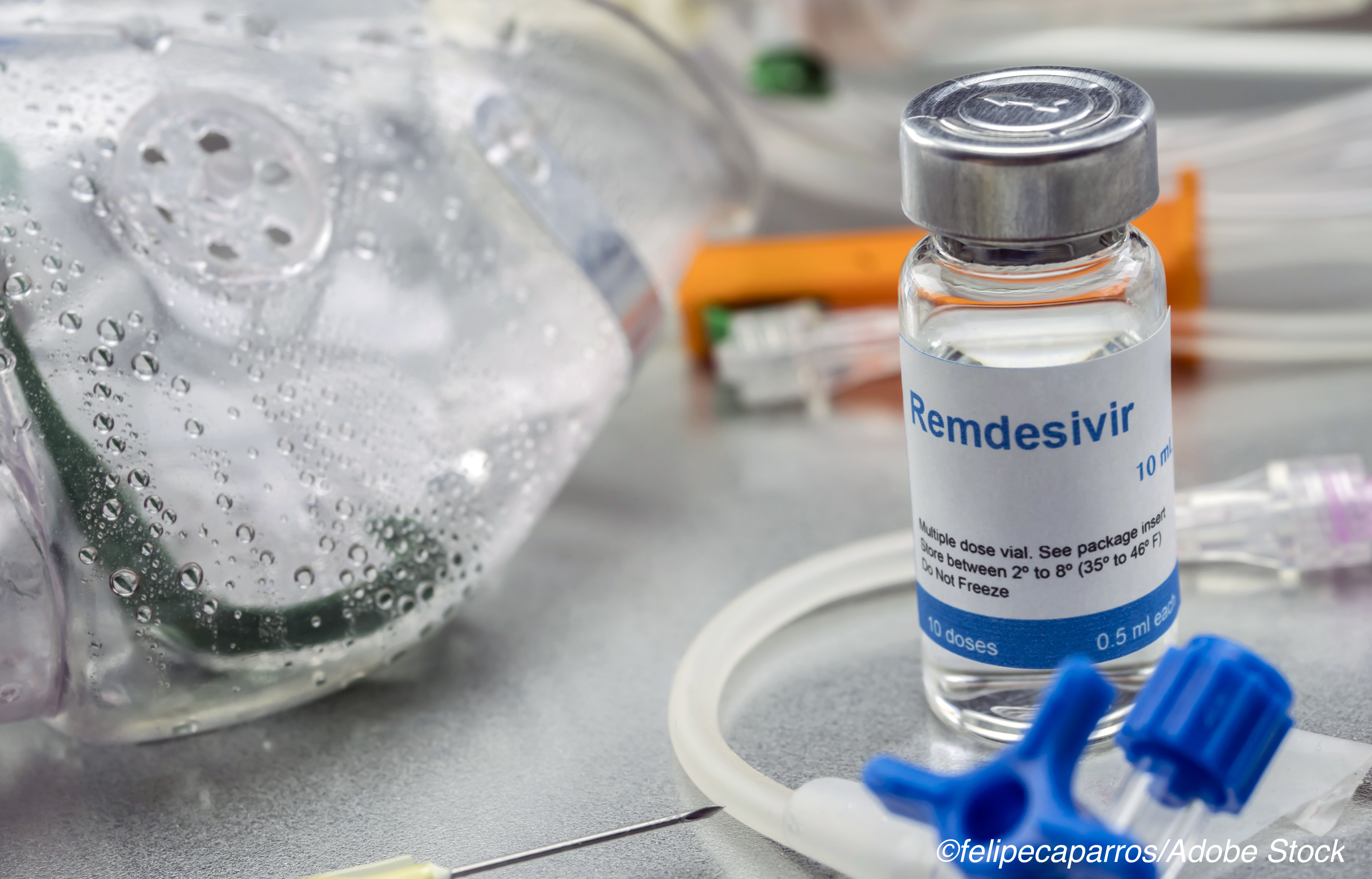In a randomized open-label trial involving close to 600 patients hospitalized with moderate Covid-19 symptoms, treatment with the antiviral agent remdesivir for 10 days was not associated with clinically significant difference in clinical status compared to standard care.
A 5-day course of the drug did appear to be beneficial — with remdesivir-treated patients showing a statistically significant difference in clinical status — but the difference was found to be of uncertain clinical importance.
On day 11, patients in the remdesivir group had higher odds of achieving a better clinical status distribution, compared to patients who were not treated with the drug (odds ratio, 1.65; 95% CI, 1.09-2.48; P=0.02).
Findings from the phase III trial, funded by remdesivir manufacturer Gilead Sciences, were published online Aug. 21 in JAMA.
To date, three randomized trials examining the efficacy of remdesivir as a treatment of Covid-19 have been published, with mixed results.
Two studies published this spring reported conflicting results, with a trial from Hubei, China showing no benefit with a 10-day course of remdesivir compared to placebo, while the ACTT-1 trial found that treatment with remdesivir for up to 10 days appeared to shorten recovery time, compared to placebo, among patients hospitalized with Covid-19.
The latest study had several limitations, including the open-label design and the absence of virologic outcomes data, and researcher Christoph Spinner, MD, of Munich, Germany’s University Hopital Rechts der Isar, and colleagues, wrote that these limitations may have contributed to the failure to show a clinically meaningful benefit for treatment with remdesivir.
They noted that the ACTT-1 trial showed that “mortality and treatment effects were strongly influenced by clinical status at randomization, confirming a spectrum of severity among hospitalized patients with Covid-19.”
“Factors that contribute to patients progressing to severe and critical Covid-19 remain to be elucidated,” they wrote. “The risk of rapid disease progression described to date points to the potential benefit of earlier intervention with an effective antiviral.”
In an editorial published with the study, Erin McCreary, PharmD, and JAMA Associate Editor Derek C. Angus, MD, both of the University of the University of Pittsburgh School of Medicine, wrote that the study by Spinner et al “suggests modest clinical benefit for the 5-day course (of remdesivir) compared with standard care, although, as the authors acknowledge, the clinical importance of this finding is uncertain.”
They noted that important questions remain about the role of remdesivir as a treatment of Covid-19, including the optimal treatment population and duration of therapy, the drug’s effect on discrete clinical outcomes, and the relative effect when given in combination with dexamethasone or other corticosteroids.
McCreary and Angus called for urgent large-scale clinical trials to address these uncertainties and “inform optimal use.”
“Some of the randomized clinical trial findings suggest remdesivir could improve recovery for many millions of individuals around the world who may be hospitalized with Covid-19,” they wrote. “However, the costs to produce and distribute remdesivir at such scale are considerable, and, most importantly, whether remdesivir offers incremental benefit over corticosteroids, which are widely available and inexpensive, is unknown.”
The study by Spinner and colleagues originally included 596 patients with moderate Covid-19 (pulmonary infiltrates and room-air oxygen saturation >94%) enrolled from mid-March through mid-April at 105 hospitals in the United States, Europe and Asia. Final follow-up was May 20.
Patients were randomized in a 1:1:1 ratio to a 10-day course of remdesivir (n=197), a 5-day course of remdesivir (n=199) or standard care (n=200), with remdesivir given intravenously at 200 mg on the first day of treatment, followed by 100 mg/d for the remaining days.
A total of 584 patients began the study and received remdesivir or continued standard care (median age, 57 [IR, 46-66] years and 227 [39%] of the participants were female. A total of 533 patients (91%) completed the trial.
Common comorbidities included cardiovascular disease (56% of patients), hypertension (42%) and diabetes (40%).
The median length of treatment was 5 days for patients in the 5-day remdesivir group and 6 days for patients in the 10-day remdesivir group.
On day 11, patients in the 5-day remdesivir group had statistically significantly higher odds of a better clinical status distribution than those receiving standard care. However, the clinical status distribution on day 11 between the 10-day remdesivir and standard care groups was not significantly different (P=0.18 by Wilcoxon rank sum test).
By day 28, 9 patients had died: 2 (1%) in the 5-day remdesivir group, 3 (2%) in the 10-day remdesivir group, and 4 (2%) in the standard care group. Nausea (10% vs 3%), hypokalemia (6% vs 2%), and headache (5% vs 3%) were more frequent among remdesivir-treated patients compared with standard care.
- Patients hospitalized with moderate Covid-19 symptoms, treatment with the antiviral agent remdesivir for 10 days was not associated with clinically significant difference in clinical status compared to standard care.
- A 5-day course of the drug did appear to be beneficial, with remdesivir-treated patients showing a statistically significant difference in clinical status, but the difference was found to be of uncertain clinical importance.
Salynn Boyles, Contributing Writer, BreakingMED™
This research was funded by Gilead Sciences, Foster City, California.
Lead researchers Christoph Spinner reported receipt of personal fees from AbbVie and grants and personal fees from Janssen-Cilag, Merck Sharp & Dohme, and ViiV Healthcare/ GlaxoSmithKline. Principal investigator Francisco Marty, reported receipt of grants from Ansun,Chimerix, Gilead, and Merck and personal fees fromAlloVir, Janssen, Kyorin, Merck, ReViral, and Symbio. Several other researchers reported being employees and/or owning stock in Gilead Sciences.
Editorial writer Derek Angus reported receiving personal fees from Bristol Myers Squibb, Bayer AG, and Ferring Pharmaceuticals Inc; receiving stock options from Alung Technologies Inc; and holding a pending patent to selepressin for treating sepsis and a pending patent to proteomic biomarkers of sepsis in elderly patients.
Cat ID: 190
Topic ID: 79,190,254,930,791,932,570,730,933,190,926,192,927,151,928,925,934



Create Post
Twitter/X Preview
Logout